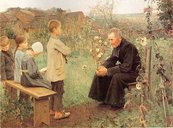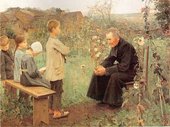 The Heidelberg Catechism: Lord's Day 19 50. Question: Why is it added, ‘And sits at the right hand of God’? Answer: Christ ascended into heaven to manifest Himself there as Head of His Church,[1] through whom the Father governs all things.[2] [1] Eph. 1:20-23; Col. 1:18. [2] Matt. 28:18; John 5:22, 23. 51. Question: How does the glory of Christ, our Head, benefit us? Answer: First, by His Holy Spirit He pours out heavenly gifts upon us, His members.[1] Second, by His power He defends and preserves us against all enemies.[2] [1] Acts 2:33; Eph. 4:7-12. [2] Ps. 2:9; 110:1, 2; John 10:27-30; Rev. 19:11-16. 52. Question: What comfort is it to you that Christ will come to judge the living and the dead? Answer: In all my sorrow and persecution I lift up my head and eagerly await as judge from heaven the very same person who before has submitted Himself to the judgment of God for my sake, and has removed all the curse from me.[1] He will cast all His and my enemies into everlasting condemnation, but He will take me and all His chosen ones to Himself into heavenly joy and glory.[2] [1] Luke 21:28; Rom. 8:22-25; Phil. 3:20,21; Tit. 2:13, 14. [2] Matt. 25:31-46; I Thess. 4:16, 17; II Thess. 1:6-10.
0 Comments
 The Heidelberg Catechism: Lord's Day 13 33. Question: Why is He called God's only begotten Son, since we also are children of God? Answer: Because Christ alone is the eternal, natural Son of God.[1] We, however, are children of God by adoption, through grace, for Christ's sake.[2] [1] John 1:1-3, 14, 18; 3:16; Rom. 8:32; Heb. 1; I John 4:9. [2] John 1:12; Rom. 8:14-17; Gal. 4:6; Eph. 1:5, 6. 34. Question: Why do you call Him our Lord? Answer: Because He has ransomed us, body and soul,[1] from all our sins, not with silver or gold but with His precious blood,[2] and has freed us from all the power of the devil to make us His own possession.[3] [1] I Cor. 6:20; I Tim. 2:5, 6. [2] I Peter 1:18, 19. [3] Col. 1:13, 14; Heb. 2:14, 15. |
The Heidelberg
|
 RSS Feed
RSS Feed
